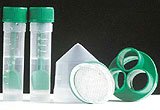
MIGUEL BOYAYANComplete Kit: tested at four universities MIGUEL BOYAYAN
On a daily basis microscopic forms dispute the nutrients consumed by 52% of the Brazilian population, according to data published last year by the Pan-American Health Organization (Opas). The study points out that these individuals carry in their intestine at least one parasite: protozoa (for example, amoebas) or helminths, responsible for discomfort or abdominal colic, anemia, tiredness and diarrhea. In order to detect these parasitic infections, doctors recommend three samples of feces, collected on alternate days and processed separately by laboratories.
This procedure takes time, and very often is not carried out by the patient. The solution for more efficient examinations may lie with a new method, called TF-Test, which processes the three sample in only one stage. The TF-Test is under development by the company Immunoassay, through a project financed by FAPESP’s Small Business Innovation Research (PIPE) program. In the opinion of Sumie Hoshino Shimizu, a retired professor from the University of São Paulo (USP) and the project’s coordinator, the advantage of this technique is in concentrating the samples, producing a diagnosis even in the more difficult cases in which the individual shows a low degree of infection. “In traditional tests, many cases gave false negative results”, he explains.
The product is composed of a diagnostic kit with three collection tubes for fecal samples that, when handed into the laboratory, are held in a receptacle set up to filter and centrifuge the material for analysis. The kits have already been tested in four diagnosis laboratories of São Paulo universities. In comparison with the most widely used techniques in conventional parasitic examinations, the results point to the superiority of the new technique to the methods and the kits currently in use on the market.
Resistant plastic
The innovation and the gains are not just limited to the savings produced through the procedure. Plastic resins were tested so that the flasks could be transported without any alteration to the plastic, originating from possible reactions promoted by solutions of formalin, the preservative chosen to conserve the collected material over a ten-day period. The top, which closes with a simple downward push, inhibits any small leaks.
Sumie says that the new product is important for public health because, by doing away with refrigeration for up to ten days, it makes it possible for the inhabitants of places where there is no electrical power to have access to these examinations.
The Project
Development of New Kits Destined for the Diagnosis of Intestinal Parasites in Fecal Samples (nº 99/06228-4); Modality Small Business Innovation Research (PIPE) program; Coordinator Professor Sumie Hoshino Shimizu – Immunoassay; Investment R$ 386,265.60 and US$ 7,866.00